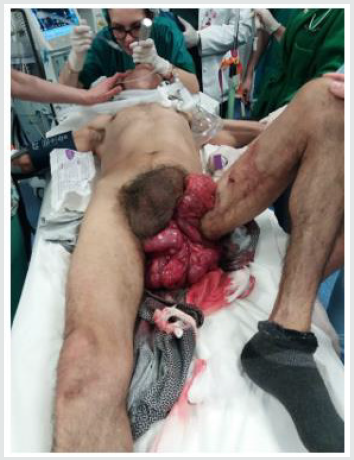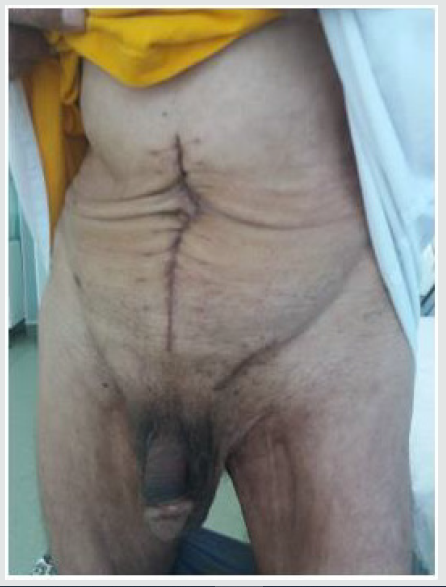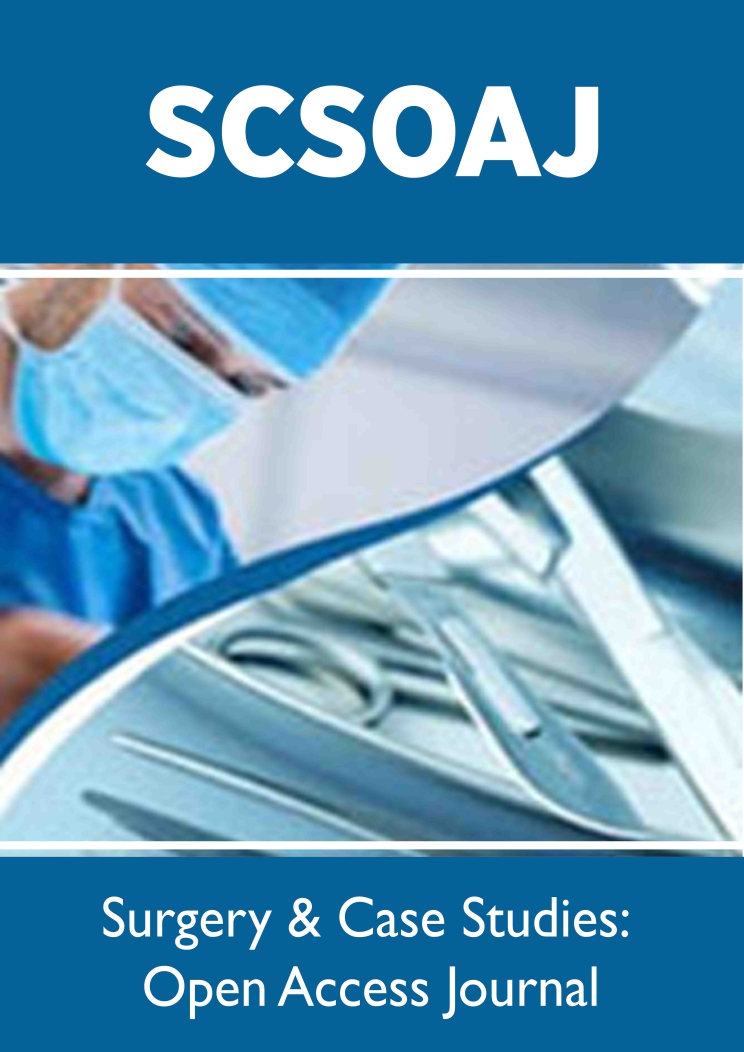
Lupine Publishers Group
Lupine Publishers
Menu
ISSN: 2643-6760
Review Article(ISSN: 2643-6760) 
Free Evisceration A Rare Complication of Inguinal Hernia Volume 6 - Issue 1
Radu D1*, Bistrian E2, Precup M3, Ghirlea O4 and Olariu S5
- 1Department of Surgery, Victor Babes University of Medicine and Pharmacy, Romania
- 2MD. PhD Surgery Clinic, Pius Brînzeu County Emergency Hospital, Romania
- 3Surgeon, Surgery Clinic, Pius Brînzeu County Emergency Hospital, Romania
- 4Rezident in Surgery, Surgery Clinic, Pius Brînzeu County Emergency Hospital, Romania
- 5Chief of 1st Surgical Clinic, Pius Brînzeu County Emergency Hospital, Romania, Professor of surgery, Department of Surgery, Victor Babes University of Medicine and Pharmacy, Romania
Received: January 07, 2021; Published: January 26, 2021
Corresponding author:Radu D, Department of Surgery, Victor Babes University of Medicine and Pharmacy, Timisoara, Romania
DOI: 10.32474/SCSOAJ.2021.06.000228
Abstract
The presentation of this case is necessary to understand the importance of therapeutic intervention at the best time for the disease, when it is not complicated when it is not complicated, because unjustified delay in treatment or surgery has serious, sometimes fatal consequences, at best the costs of treatment increase, sequelae generally occur, but often the evolution of a relatively benign condition can lead to the death of the patient. Patient with old, neglected left inguinal hernia, insidiously migrated to the scrotum and where there have recently been decubitus skin lesions, suddenly suffers from aggravation following a coughing access with evisceration of the intestinal contents through the scrotum. He is brought urgently to the emergency room of SCJUPBT where he is taken over and examined quickly, the distance in time between the presentation to the emergency room and the intervention being almost 30 min. The right and the fastest surgery is consisting in reintroduction of intestinal loops in the peritoneal cavity even if sacrificing a portion of the ileum and left testicle is necessary, the cure of hernia through intraperitoneal approach, surgery that led to favorable evolution and fast healing, without complications, the patient being discharge 10 days postoperatively . Thereby the expected favorable result is obtained. In conclusion, the very good result of the treatment obtained in the presented patient is due to how quickly the patient was brought to our service, a quick surgery, with correct indication and technique, decisive factors in curing a disease without sequelae and without recurrences.
Keywords:Preventive therapy; inguinal hernia; evisceration; technique
Introduction
In recent years, there has been a lot of emphasis on patient scheduling for surgical intervention for various reasons, the most common being budgetary constraints. Postponing an intervention in patients with poor health education or in those who are not convinced that surgery is absolutely necessary for healing is often fatal. No patient is happy to accept the idea of surgery and if he is told that it is not necessary in the near future but to think about it and come back for an appointment then we can be sure that he will not do that in the vast majority of cases. At the moment I insist on this issue because in the last year these situations have become a practice due to the fear of infection with the SARS CoV 2 virus, the fear felt both by medical staff and especially by patients, who only see a doctor in emergency situations. Inguinal hernia is considered a benign condition that does not require general anesthesia and is operated on without major risk at any age. Often, both medical staff and patients tend to trivialize this condition, saying “it’s just a hernia” and not recommend or insist on surgery as soon as possible. This attitude is wrong from several points of view! The hernia can get complicated at any time and the condition turns in a few hours from a trivial hernia into a strangled hernia, in which case if it’s not intervened in a timely manner an intestinal resection can be necessary. It is not uncommon for a hernia to get infected or complicated by intestinal obstruction (Figures 1 & 2). Hernia, especially when the cause of its occurrence is not identified, over a certain age, can be a so-called symptomatic hernia, masking a tumor process, usually in the colon, the hernia appearing insidiously, as a result of daily defecation effort, in conditions of narrowing of the colonic lumen through the tumor process. Hernia, especially when the cause of its occurrence is not identified, over a certain age, can be a so-called symptomatic hernia, masking a tumoral process, usually in the colon, the hernia appearing insidiously, as a result of daily defecation effort due to narrowing of the colonic lumen through the tumoral process. Even in this case the failure to see a doctor immediately after the onset of hernia is to the detriment of the patient, therefor a patient who is deprived of appropriate treatment in a timely manner will discover the tumoral process after a while, in the symptomatic period, stage of the disease that can be related to surgically surpassed level therefor not being able to perform radical cure of the disease that would lead to complete healing. In all these situations, the surgery is more extensive, the risk of anesthesia and surgery increases, the rate of complications and the risk of recurrences increase as well. The case we present is not part of the frequent, common series of complications of inguinal hernia, is a rare case, it is described as spontaneous intestinal evisceration through an inguinal hernia complicated with skin trophic lesions, evisceration which was produced after minimal effort, a coughing effort.
Purpose
The presentation of this case is necessary to understand the optimal time of the condition in which the surgery must be performed, when it is not complicated because the unjustified postponement of treatment or surgery has serious, sometimes fatal consequences, sequels occur, but often the evolution of a relatively benign condition can lead to the death of the patient.
Clinical Case
On March 26, 2018, the patient M.M., aged 75, from rural areas, is brought by ambulance to the emergency room of SCJUPBT, hospitalized and transported to the operating room after a short clinical , surgical and pre-anesthetic evaluation, laboratory analyzes and electrocardiographic route being performed. At admission it is found that the patient is cachectic, with the general condition affected, with complete evisceration of the small intestine and sigmoid loop through the scrotal decubitus ulceration, through a left groin hernia with “loss of right to domicile” and skin lesions. The surgery, performed under general anesthesia, lasted 2 hours and consisted of median laparotomy, from the xiphoid appendix to the pubic bone, with the opening of the peritoneal cavity and an attempt to reintroduction the intestinal loops and the sigmoid loop eviscerated externally through the ruptured herniated sack. This fails due to the age of the hernia, with the loss of right to domicile of the contents of the hernia sack and ileal resection is performed by restoring the continuity of the digestive tract by lateral-lateral cecal-ileum anastomosis (taking into account the different dimensions of the lumen of the 2 anastomosed ends). ; resection of the excess of the hernial sack, cure of inguinal hernia by intraperitoneal approach, Novocaine injection to optimize intestinal loop vascularization, left orchiectomy, lavage of the peritoneal cavity, drainage of the Douglas space, digital anal dilation. The electrocardiogram reveals microvolt in all leads. Laboratory tests performed in the emergency department show mild leukocytosis: 11.8 / 103μL (VN = 4.0-9.5 / 103μL) with decreased level of blood lymphocytes and monocytes: 9.4% lymphocytes (VN = 20-40%) and 1% monocytes (VN = 3, 5-9.5%), neutrophil growth to 89.6 (VN = 45-70%). Anemic syndrome revealed by a decrease in the number of erythrocytes at 3.69 x106 μL (VN = 4.5-5.9 x106 μL) and serum hemoglobin at 12.1 g / dl (VN = 13.6-17.2 g / dl ), change in serum ionogram with decreasing alkaline reserve (21 / mmol / l, VN = 22-29 / mmol / l) and potassium (2.5 mmol / l VN = 3.5- 5.1 mmol / l) . Serum enzymes also undergo small changes in the sense of elevating creatine kinase to 739 U / L (V.N. = 30-170 U / L), serum LDS to 239U / L (V.N. = 125-220 U / L). The postoperative evolution is normal, monitoring in the surgery department, local asepsis and antibiotic treatment (combination of Ceftriaxone and Meropenem for 3 days, which is then replaced by Metronidazole i.e.), prophylaxis of thromboembolic accidents with fractionated heparin, postoperative pain therapy was performed. Intestinal transit is resumed for gas at 48 hours, oral feeding is resumed after 72 hours, drainage from the Douglas space is suppressed on the 5th day, the stitches are removed after 10 days and the patient is discharged as being surgically cured on the 10th day postoperatively.
Results
Patient with old, neglected left inguinal hernia, insidiously migrated in the scrotum and lately with decubitus skin lesions at this level, suddenly suffers an aggravation due to a coughing access with the evisceration of the intestinal contents through the hernia. He is brought to the emergency room of SCJUPBT where he is quickly taken over and examined, the distance in time between the moment of presentation to the emergency room and the beginning of the intervention is about 30 min. Correct and fast surgery consisting in the reintroduction of intestinal loops in the peritoneal cavity even with the sacrifice of a portion of the ileum and left testicle, the cure of intraperitoneal hernia, led to favorable evolution and fast healing, without complications and the discharge at 10 days postoperatively. Thus, the expected favorable result is obtained.
Discussion: Anesthetic and Surgical Risk
The prognosis of such a case is burdened by complications: intraabdominal infections, peritonitis, intestinal fistulas, suppuration of the wound with eventrations over time. Orchiectomy was necessary due to tight adhesions of the hernial sack to the spermatic cord, of which dissection could lead to disruption of viability of the testicle and subsequent necrosis. The changes in the blood count were due to the pre-existing conditions (prolonged starvation) the anemic syndrome endangering the healing of the postoperative wound. Deterioration of the serum ionogram and serum gas was in progress, the presentation to the emergency room shortly after the production of free evisceration was a favorable condition that contributed to the immediate establishment of surgical treatment and the favorable evolution of the case, without complications. Also, the absence of severe comorbidities, possibly decompensated, was another favorable factor for the fast healing of the case, along with the correct surgical indication, with appropriate and correctly and quickly performed surgical technique. The costs of hospitalization of this patient who evolved fortunately without complications were 2241 RON, given the fact that the costs of treatment and settlement of an uncomplicated inguinal hernia are a maximum of 890 RON. Additional costs of 1351 RON would not have happened if the patient had been treated properly before the complication. Although rare, this spectacular complication exists and can be prevented, as well as the other possible complications of an inguinal hernia. Performing surgery as close as possible to the onset period of the hernia would have been easier because there would have been no adhesions to the hernia sac, orchiectomy wouldn’t have been necessary either, or the intestinal resection.
Conclusions
a. Any pathological condition, even a trivial one, requires specialist consultation in accordance to respecting exactly and in time the medical indications
b. Unjustified delay of a hernia surgery can have serious consequences for the patient.
c. The presentation in the emergency room as soon as possible after the complication of a pre-existing condition, in our case of the inguinal hernia and performing the appropriate emergency treatment can save the patient’s life.
d. The very good result of the treatment obtained in the presented patient is due to the speed with which the patient was brought to our service, a quick surgery, with correct indication and technique, determinant factors in curing a disease without sequelae and without recurrences.

Top Editors
-

Mark E Smith
Bio chemistry
University of Texas Medical Branch, USA -

Lawrence A Presley
Department of Criminal Justice
Liberty University, USA -

Thomas W Miller
Department of Psychiatry
University of Kentucky, USA -

Gjumrakch Aliev
Department of Medicine
Gally International Biomedical Research & Consulting LLC, USA -

Christopher Bryant
Department of Urbanisation and Agricultural
Montreal university, USA -

Robert William Frare
Oral & Maxillofacial Pathology
New York University, USA -

Rudolph Modesto Navari
Gastroenterology and Hepatology
University of Alabama, UK -

Andrew Hague
Department of Medicine
Universities of Bradford, UK -

George Gregory Buttigieg
Maltese College of Obstetrics and Gynaecology, Europe -

Chen-Hsiung Yeh
Oncology
Circulogene Theranostics, England -
.png)
Emilio Bucio-Carrillo
Radiation Chemistry
National University of Mexico, USA -
.jpg)
Casey J Grenier
Analytical Chemistry
Wentworth Institute of Technology, USA -
Hany Atalah
Minimally Invasive Surgery
Mercer University school of Medicine, USA -

Abu-Hussein Muhamad
Pediatric Dentistry
University of Athens , Greece

The annual scholar awards from Lupine Publishers honor a selected number Read More...






